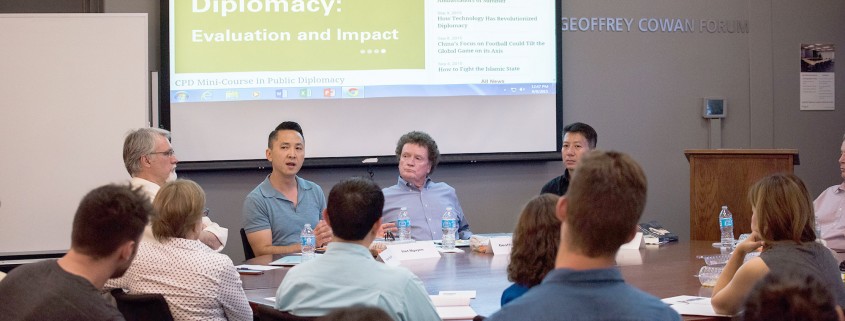Professors discuss history of American foreign policy
Three USC professors spoke at the panel discussion, “Isolate or Engage: Adversarial States, U.S. Foreign Policy and Public Diplomacy” Wednesday on the United States’ history of foreign policy in the Geoffrey Cowan Forum.
Geoffrey Wiseman, Robert English and Viet Nguyen are experts in public diplomacy, the Soviet Union/Russia and Vietnam, respectively. The professors are members of the Dornsife College of Letters, Arts and Sciences.
Wiseman’s book, Isolate or Engage, was released in early July around the time of the Obama Administration’s announcement regarding re-establishing diplomatic connections with Cuba, a previously “adversarial state.” Wiseman said that “adversarial” is “a less hostile term than [the usual] pariah or rogue state.”
The basis of dealing with adversarial states is in the “U.S.’s preference for isolation over engagement,” Wiseman said.
Isolate or Engage explores the U.S. cutting diplomatic ties with Cuba, China, the USSR, North Korea and Vietnam historically. Wiseman mentions in the introduction of the book that Iran, Libya, Syria and Venezuela have been added to that list.
“There are two major arguments against engagement [with adversarial states],” he said. “One is that engagement rewards bad behavior. The second is that it implies the legitimacy of the adversarial state.”
English, an associate professor of international relations, slavic languages and literature and environmental studies, read excerpts from the chapter he wrote for Isolate or Engage, “Soviet Union/Russia: US Diplomacy with the Russian Adversary.” The chapter addresses the historical lessons of U.S. diplomacy with Russia.
“Public diplomacy has been very important in the [U.S.’s] long history with the USSR and Russia, both in its presence and absence,” English said.
Nguyen, an associate professor of English and American studies and ethnicity, was also a contributor to Isolate or Engage, having co-authored the fourth chapter, “Vietnam: American and Vietnamese Public Diplomacy, 1945-2010.”
“From 1945, public diplomacy in Vietnam becomes very critical,” Nguyen said. “The Americans’ involvement in Vietnam happened immediately after the East Asian country declared itself free from French colonial rule. Several associations were set up to facilitate a thriving relationship between the two countries. However, the good will did not last.”
Nguyen wrote about the French influence on U.S. policy in Vietnam.
“With the formal outbreak of war between France and [Vietnam] in 1946, the United States took a position of pro-French neutrality,” Nguyen wrote in Isolate or Engage.
According to Nguyen, this began the punishment of the Vietnamese via isolation by the U.S. government.
Wiseman said that while there are disadvantages to engagement, there is also a distinct disadvantage to isolation. Isolation does not allow the U.S. governments to know what is happening inside a country they have deemed adversarial and thus isolated.
“The CIA, the FBI, rather than gathering reports from inside the isolated country itself, are instead in Washington,” Wiseman said.

